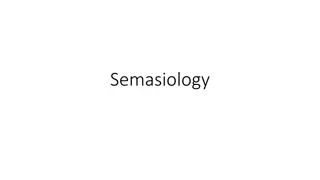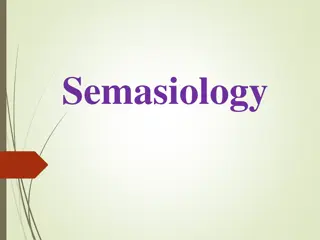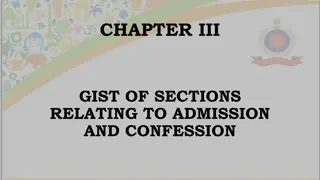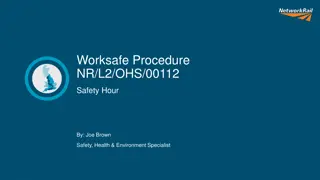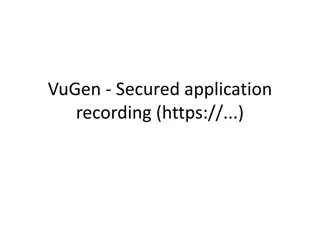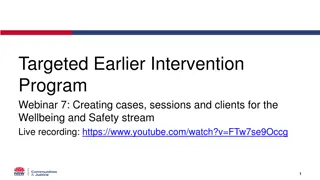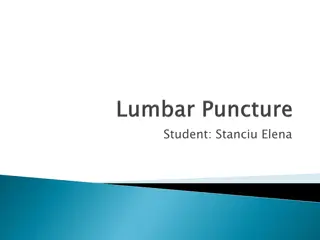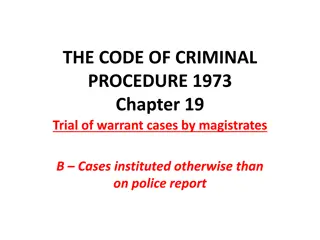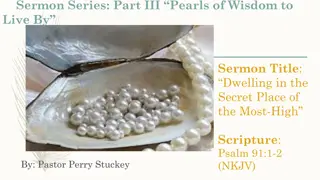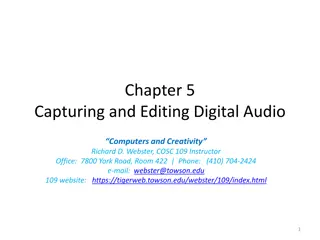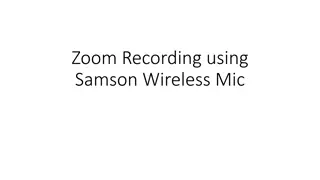Understanding Confession: Meaning, Types, and Recording Procedure
Confession is a statement by an accused admitting guilt. It serves as proof of the offender's guilt. This article explores the definition of confession, its types, and the procedure for recording a confession. Presented by Abdul Qayyum Siddiqui, a District & Sessions Judge, the discussion delves into the legal aspects of confession in criminal proceedings.
Uploaded on Jul 22, 2024 | 0 Views
Download Presentation

Please find below an Image/Link to download the presentation.
The content on the website is provided AS IS for your information and personal use only. It may not be sold, licensed, or shared on other websites without obtaining consent from the author. Download presentation by click this link. If you encounter any issues during the download, it is possible that the publisher has removed the file from their server.
E N D
Presentation Transcript
Confession, its meaning, kinds & procedure of recording confession Presented By: Abdul Qayyum Siddiqui Addl:District & Sessions Judge-VI, Mansehra
INTRODUCTION The expression confession means a statement made by an accused admitting his guilt. It is an admission as to the commission of an offence. If a person accused of an offence makes a statement against himself, it is called confession or confessional statement. Confessions are the special form of admissions. Thus it is popularly said that "All Confessions are admissions, but all Admissions are not confessions." 1.
2. derived from root word confess which means admit, acknowledge, concede or accept something. It is a term generally used in criminal acknowledgement of guilt of commission of an offence. Confession is a good source of proof of guilt of offender. The word confession has not been defined anywhere in Pakistani laws or even in the Qanoon-e-Shahadat Order, 1984. It is however defined in United Kingdom, under section 82 Part VIII, of Police and Criminal Evidence Act, 1984 that confession includes any statement whollyor partlyadverse to the Confession literally means admission. The term is laws which means
person who made it, whether made to a person in authority or not and whether made in words or otherwise. From the of above definition of UK statute the confession is admissible even if it is made before any person whether or not such person is in authority or not and whether or not it is made in words or otherwise, unlike the Pakistani Law of Evidence or Code of Criminal Procedure, 1898, wherein a proper procedure of recording the confessional statement is provided before the competent Judicial Magistrate, details shall be discussed later on in this paper.
Definition a). at any time by a person charged with a crime stating or suggesting the inference that he committed a crime". If a statement made by a party in the civil proceeding, it is called as admission while if it is made by the party charged with the crime, in a criminal proceeding, it is called as a confession. Thus, the confession is a statement made by the person charged with a crime suggesting an inference as to any fact in issue or as to relevant fact. The inference that the statement should suggest that he is guilty of a crime. Confession, in short, is an admission by the accused charged with an offence in the of Confession: According to Sir James Stephen "An admission made criminal proceeding.
b). History I. CONFESSION IN ANCIENT LEGAL SYSTEMS The Greek and Roman Empires had used to admit the confession of an accused when a Magistrate put charge to them and they admit their guilt. Such confessional statement at the time of charge would entail a lesser punishment, awarded by the Tribune of magistrates held in public, than provided foran offence.
II.CONFESSION IN ASIAN STATES In early Chines system confession was deemed at high value and would entail no punishment or low punishment only, where such offence were not known to the authorities. Such confessions were used to be discussed with elders to repent from sins in China. During Tang Dynasty confessions were extracted by use of torture, force, coercion and maltreatment to the accused. This procedure was continued till 1980s when for the very first time torture was prohibited in china to extract confession from the accused. Same effects are found in the Japan legal system as that of China. Japan legal system is much more influenced by Chines System. The Indian legal system also emphasize upon confession in their law of Manu which concept basically needs to purify the sinner from the offence committed by him. In Pakistan legal system the confession orplea of guilt is deemed to be a ground of lesserpunishment particularly in minoroffence.
III.Confession in Europe and United States Old European history shows that usually confessions were drawn by way of torture during investigation and main objectives were to punish the criminal. In European Legal System, unlike the Asian and other systems, usually no concession was awarded in punishing the offender who made confession. Usually during 16thCentury, European states used torture as a legal tool to extract confession from the offender which lasted till 18thCentury by an abolitionist enlightenment scholars movement. judicial system of Europe, the judge has no authority to extract the confession by any means unlike the inquisitorial system of early pope. In inquisitorial
Later on in the middle ages, the judges in Europe had authority to even reject the evidence or confession obtained by use of torture or coercion. The United States of America adopted most of the law of European States initially but later on it adopted and developed its own laws and became known Admissibility of confession by use of torture was deemed to be violation of Fundamental Human Rights, as the same were protected under the US Constitution. All the laws of US were revolving around the concept of Human Rights thus tortureused in extracting confession as American Laws.
were declared illegal and unlawful and were not relied upon by the US judicial system. In 1791 US constitution s Fifth Amendment; it was clearly mentioned that no one shall be compelled to be witness against himself . this amendment was only enforceable upon Federal Agencies and courts but not binding upon States of USA until it was held by the US Supreme Court in Hopt v/s Utah case, 1884 and prohibited all institutions in US to prohibit them from use of torture for extracting the confession from offenders in any manner whatsoever. Thus during 1930 s to 1960 s period a number of appeals were decided by US Supreme Court whereby reversed a great deal of convictions awarded upon confession extracted by torture orcoercion.
Unlike many other legal systems, currently the US law permit the promised confession to be admissible in evidence, whereby a reduced conviction is awarded by the courts, commonly known as plea arrangement. The plea arrangement is made during initial inquiry or investigation by police or the prosecutor where accused agrees to disclose the full and true account of commission of offence to the authorities on promise that he shall be awarded lesser punishment than that of maximum one provided by the law for the offence committed.
IV.Islamic legal system Islamic Law is based on primary and secondary sources; Primary Sources are the Holy Quran and the Sunnah whereas the secondary sources are Ijma, Qias, Istehsan, Istiswab, Maslaha Mursala etc. Both the sources recognize the admissibility of confessional statement thereby entail punishment. In Islamic law where a person admits his spiritual guilt, called TAWBA, Allah has ordained that such person shall not only be forgiven but his sins shall be converted into good deeds on dooms day. The Holy prophet (PBUH) has awarded punishment of Hadd upon sinners who confessed before the prophet (peace be upon him). Islamic Law, however, does not provide that any leniency is shown to the accused who made confession. Holy Prophet (Peace be upon him) has awarded punishment of Hadd to Maiz Al Aslami, who confessed the guilt of commission of Zina. This notion is discussed in almostall books of Islamic Fiqh in the chapterof Al-Iqrar.
V. Pakistan Legal System In Pakistani legal system, the term confession is not defined anywhere. However, the term is used in the Code of Criminal Procedure, 1898 (Cr.P.C) and the Qanoon-e-Shahadat Order, 1984. The Cr.P.C provides that the confessions shall be recorded in immediate presence of a Judicial Magistrate of First Class or Second Class especially empowered by the Government. There are certain checks and balances that the confession is made voluntary and without any undue influence, coercion, promise, threat etc. Lest the confessional statement has no value. The Judicial Magistrate shall record it during course of investigation but not at later stage. He shall also certify that the statement so recorded is made voluntary and free from any threatand promise.
c). Statutory law of UK The Police and Criminal Evidence Act, 1984 provides under section 76 that in any proceedings a confession made by accused may be used in evidence against him to the extent of its relevancy. The confession made before police officer is also admissible subject to conditions as provided under section 76 sub section 2 and section 8 of the said Act, 1984 that the confession is obtained by operation which includes torture, inhuman or degrading treatment use or threat of violencewhetheror notamounting to torture.
The courts have to consider such statement recorded by police during investigation or interrogation, more vigilantly and by applying judicial mind keeping in consideration the facts and circumstances of each case differently. Under section 176-A, the statement of an accused may be used against co-accused in the same proceedings subject to its being made without operation, and must be relevant in the matter, as discussed above. incorporated in the Act, 1984 which is section 77 confessions by mentally handicapped accused. The court has ample powers provided under section 76 (2) of Police and Criminal Evidence Act, 1984 to exclude the confession evidence obtained by operation and thus declare it to be unreliable. Section 82 define that confession includes: A special provision is
Any statement wholly or partly adverse to the person who made it Whether made to a person in authority or not; Whether made in words or otherwise. From above definition it is clear that the statement made before any person which amounts to a confession is admissible in evidence subject to the restrictions mentioned in section 76 (2) of Police And Criminal Evidence Act, 1984. An exculpatory evidence is not a confession and can not be deemed to fall under provisions of section 76 of the Act, 1984. When such confession made by accused or collected by prosecution, the accused has right to challenge it in the vires of section 76 of the Act, 1984, then the burden lies upon prosecution that the confession was free from operation.
d). Statutory law of Pakistan The concept of confessional statement is provided under section 164 Criminal Procedure Code 1898 whereas the procedure is provided under section 364 of the same code. Section 164 Cr.P.C provides that the Magistrate of First Class or a Magistrate of second class duly authorized by provincial government shall be competent to record the statement of an accused. This section excludes any other person whether or not police officer or any other one from recording confessional statement of an accused. The Quanoon-e-Shahadat Order, 1984 provides conditions for admissibility of a confessional statement made by an accused person.
Article 37 of Quanoon-e-Shahadat Order 1984 states that when confession is made due to threat, inducement or promise etc it shall be irrelevant and inadmissible in the court of law. Unlike Unite Kingdom laws, the provisions of Article 38 prohibits that proving any confession made to a police officer during course of investigation. Whereas in UK laws, the statement made before police during investigation or interrogation shall be proved as against the maker. The prosecution can put such statement, in UK, before the court with affirmation that the statement was given by the accused without any coercion, compulsion or operation. In Pakistani law there is no such provision to make the confessional statement of accused made before police, is admissible.
Under the prevalent law of Pakistan, the statement of accused is admissible in evidence against himself if it is made before the Judicial Magistrate of First class or Second Class specially authorized by Provincial Government. Article 16 Quanoon-e-Shahadat Order, 1984 states that an accused can be competent witness against an accused except in Hudood cases. This proposition is qualified Illustration (b) of the same Ordinance that an accomplice is unworthy of credit unless he is corroborated in material particulars. Section 337 and 338 of Cr.P.C provide procedure of acceptance of statement of an accomplice during trial of the criminal case. with Article 129
Wherein it is stated that the incharge of the prosecution may tender pardon on certain terms and conditions to be fulfilled by the accomplice to give full and true version of the commission of an offence resulting his acquittal conditionally. If the accomplice did not give full and true version of commission of offence then he may be convicted on the same offence upon his own such statement.
e). Kinds of Confession: There are four kinds of Confession, 1) Judicial confession- Magistrate in court due course of a judicial proceeding. It is applicable & most of the time used as evidence, it is also recorded as per the provisions of Section 164 of Cr.P.C. The Magistrate who records a confession as per section 164, Criminal Procedure Code, must warn the accused person who is about to confess that he may or may not be taken as consent. After warning the accused person he must give time to think over the situation and then only recording of the confessions are possible. Such confession is called judicial confession. A Confession made before
2) Extra-Judicial Confession- Confession which is not made before a Magistrate or any Court in due course of a judicial proceeding, it is made either to police during the investigation or into police custody or made otherwise than to the police. Extra-Judicial confession is not relevant. Previously it was well settled that a conviction could be based on a voluntary confession, but as per rule of prudence, it should be corroborated Confession is generally ruled out if the court thinks that it is not subjected to judicial examination or investigation. Such type of confession must be corroborated by some other proof or else it is not sufficient to warrant a conviction. It is admissible only if it inspires voluntarily. by independent evidence. confidence and made
3) Retracted Confession- A confession made before the trial begins by an accused person through which he/she admits to committing any offense but the accused person discards itat the trial. It is something that happens in most cases especially with criminal cases. The reason behind this is poor police protection or lack of development mechanism for the protection of witness or in case of high profile cases inherent securities of the witnesses or the accused under the influence of the status of the opposing party.
4) same offense, and a confession made by one of them affecting himself and some other of such persons is proved, the Court may take into consideration such confession as against such other person as well as against the person who makes such confession. Illustrations (a) E and F are jointly tried for the murder of C. It is proved that E said F and I murdered C . The court may consider the effect of this confession as against F. (b) E is on his trial for the murder of C. There is evidence to show that C was murdered by E and F and that F said, E and I murdered C . The statement may not be taken into consideration by the Court against E because F is not being jointly tried. Confession by co-accused- When more than one persons are tried jointly for the
f). RECORDING OF CONFESSION:- Section 164 of the Criminal Procedure Code deals with the magistrate s power to record a confession and other statements. The confession so recorded can be used as substantiveevidence. Manner of Recording a Confession under Cr.PC Before recording a confession, the magistrate has to explain to the person (i) he is not bound to make such confession (ii) and if he makes such a confession, it can be used against him as evidence. confessing that:
Provisions of section 164 of the Criminal Procedure Code act as a safety valve to prohibit involuntary confession. To ensure that the confession is made voluntarily following directions are to be followed by the magistrate: i. After giving the above-said warning, the magistrate should provide adequate time to the accused to think so that he is free from police influence (when he comes from policecustody). ii. The accused will be asked about the treatment that he received in custody.
iii. If there are any marks or injuries on the accused person s body, hewill be asked how he received them. iv. If the accused is handcuffed, his handcuffs will be ordered to be removed. v. If the accused expresses his unwillingness to make a confession, then he will not be remanded to police custody. vi. Accused will be asked the reason as to why he is making such a statement which is against his self- interest.
vii. The magistrate has to apply his judicial mind to ascertain that the accused confessing is not under any kind of influence, threator promise. viii. The court can reject a confession if it is not found to be perfectlyvoluntary. ix. To determine the voluntariness of the confession, the prisoner s mental state must be considered. x. If the prisoner knows how to write, he may be asked to give his confession in writing to derive the real version from the prisoner himself. xi. The magistrate can explain to him his right to consult a lawyer before recording his confession.
How a Confession is Recorded under CrPC? It is to be noted that no oath shall be administered to the accused while recording his confession. The record shall be read over to the accused in the language which he understands. A memorandum of substance will be prepared by the magistrate recording the confession, and it will be signed by the accused and the magistrate. The magistrate who records the confession statement shall then send the record directly to the (court) by whom the case is to be tried.
Format of Memorandum. The format of the memorandum is as follows: I have explained to (name) that he is not bound to make a confession and that, if he does so, any confession he may make may be used as evidence against him, and I believe that this confession was voluntarily made. It was taken in my presence and hearing and was read over to the person making it and admitted by him to be correct, and it contains a full and true account of the statement (Signed) A. B. Magistrate made by him.
Conclusion: To made a confessional statement admissible in evidence, which is recorded during investigation, there is a dire need of law to be amended with strict terms and conditions. The environment of interrogation and investigation be upgraded with modern devices and equipment as such the same come in the ambit of evidence extracted under article 164 of Qanoon-e- Shahdat Order, 1984.









